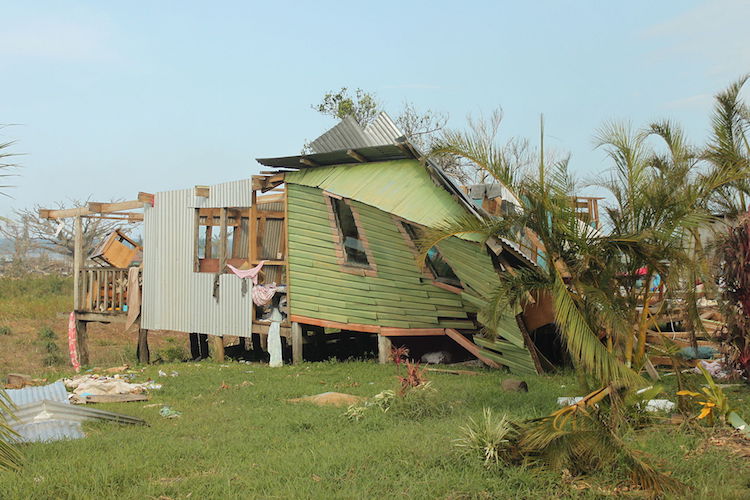By Neelam Prasad
This is the third in a series of features on the South Pacific produced in collaboration with Wansolwara, an independent student newspaper of the University of the South Pacific.
SUVA, Fiji (IDN) – Climatic change disasters are hitting Pacific Island nations at regular intervals in recent years, devastating communities and forcing people to move out to other areas, islands and even far away countries.
As such, there is a strong case for the peoples’ rights to recover from such climatic disasters to be included in the international human rights agenda, argue people and experts from the Pacific.
The damage caused by Cyclone Winston in February 2016 in the Fiji Islands was not merely to homes and crops, but also to entire communities who have been internally displaced.
One survivor Benita Kumari said the impact of the cyclone fully hit her when their home was destroyed. “It was the realisation that we had been rendered homeless,” she said. “I did not even think internal displacement was a big issue until leaving our home that night became the only way to save our lives.”
More than 54,000 people were displaced after Cyclone Winston, according to Fiji’s Internal Displacement Monitoring Centre (IDMC). This is about one sixth of Fiji’s population.
Academic Dr Eberhard Weber argues that while internal displacement was not a permanent issue in Fiji, it was a recurring one. “In (coastal towns of) Nadi and Ba, whenever the rivers flood, people get internally displaced and they go to evacuation centers and they stay there,” he said. “When the flood recedes, they return to their houses, most of them clean up, and life continues until the next flood.”
Even when the displacement is short-lived, the economic and financial impacts can be huge.
“Such disasters can undo the development efforts, people have taken up,” said Dr Weber. In the wake of a disaster, saving lives is the most important consideration, but human rights must be taken into account to ensure the wellbeing of those affected.
The IDMC, in its report on the situation, noted concern about the safety, protection, health, and overall living conditions of those who were displaced after the cyclone.
“Internally displaced people are particularly vulnerable,” said Dr Weber. He added that in such situations, people depend on the goodwill of others to get by and their vulnerability factor increases when people do not come forward to help.
Dr Weber said human rights covered political rights, and economic, social and cultural rights.
“The right to food, the right to housing, the right to particular basic needs are to be fulfilled,” he said. “These, among others, are incorporated in the country’s constitution. Another source of human rights is the Charter of the United Nations, which Fiji signed.”
Kumari said she believed human rights were often neglected when addressing internal displacement. “People who are displaced often face discrimination in the distribution of food rations,” she added. “Safety and protection in evacuation centers is also an issue.”
For women and people who are differently-abled, the challenge of meeting basic needs after being displaced is even greater.
This is why there is a need for a mechanism that guarantees human rights in such circumstances, said Dr Weber. He added that if any of the rights such as food security are compromised, the issue could be addressed legally.
However, he said this was very theoretical because “usually court cases take longer than people take to starve”.
The news media, argues Dr Weber, offered the more effective option to address the issues of human rights violations and internal displacement. However, he said this was dependent on how well the journalist assigned covered the issue.
“If there are proper journalists, they won’t make it a political issue,” he said. “They will make it a people’s issue, and then I guess the political system would respond to it because they don’t want to have bad public relations.”
Preventing human rights violations and fulfilling the basic needs of internally displaced persons will undoubtedly be easier with the combined efforts of government, the news media and the legal system [IDN-InDepthNews – 19 December 2016]
Photo: A home largely destroyed by the storm in Tailevu Province. Credit: Wikimedia Commons
IDN is flagship of the International Press Syndicate.

